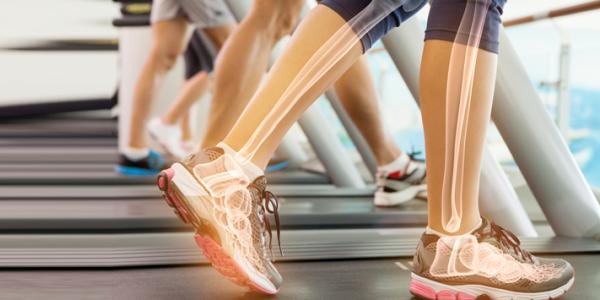
For Women Ages 45-64 -- Even if you’ve never thought much about your bone health before, you’ll need to pay more attention to it as you head towards perimenopause and menopause.
During perimenopause – which starts in the mid-40s for many women – bone mineral loss begins to accelerate as hormone levels drop. And in the first five years after menopause, the fluctuation of hormones can continue to contribute to thinning and weakening bones, with many women losing up to 20% of their bone mass. The more bone density you have built up earlier in life, the less likely you are to develop osteoporosis as a result of this gradual loss. But if exercise and a nutritious diet haven’t been a priority for several years, or if you are a smoker or drink more than the occasional glass of wine, you’ll have a higher risk of developing osteoporosis as you age.
Fortunately, there are still steps you can take to protect your bones. Consuming enough calcium is more important than ever, and you should aim for at least 1,200 milligrams every day. Low-fat dairy, sardines and salmon, dark green leafy vegetables such as spinach and kale, and calcium-fortified products such as juice and cereal are all great sources of calcium. Many of these products also contain additional vitamin D – which your body needs in order to absorb calcium. In fact, without enough vitamin D, your body could lose up to 4% of your bone mass every year. While a healthy diet is important, the biggest source of vitamin D comes from sunlight. Just 15 minutes of exposure to the sun every day can be enough, but if you don’t spend any time outdoors or are diligent about slathering on sunscreen, you should also take a vitamin D supplement daily. And if you need to take supplemental calcium to fill in any nutritional gaps in your diet, take one that contains vitamin D to ensure absorption.
Another great way to increase bone density is with exercise. In addition to the host of other health benefits, weight-bearing and resistance exercises will help strengthen your bones. Walking, hiking, racquet sports and dancing are all excellent options, but more gentle types of exercise such as tai chi and yoga are also very beneficial. The key is to find something that you enjoy, and then continue to explore new activities and options as you age.
This is also a good time commit to overcoming any bad habits you may have – such as smoking or drinking too much. Multiple studies have shown that smoking and consuming too much alcohol are directly linked to thinning bones. The longer you have smoked, and the more cigarettes you smoke, the higher your risk for bone loss. And, if you should fracture a bone, it will take longer to heal if you are a smoker. For the sake of your overall health and well as your bones, you should stop smoking immediately. Enjoying a glass of wine on occasion is fine, but if you drink too much (more than two or three drinks a day), your body can’t absorb the calcium and vitamin D it needs to maintain healthy bones.
Osteoporosis – and the fear of fractures and falling – isn’t a normal and inevitable part of aging. The key to avoiding these problems is to take steps now to maintain your bone mass and stay healthy and strong. It’s not too late to establish good habits, and your efforts will pay off as you enjoy an active lifestyle and the bone strength to do everyday tasks without worry.

